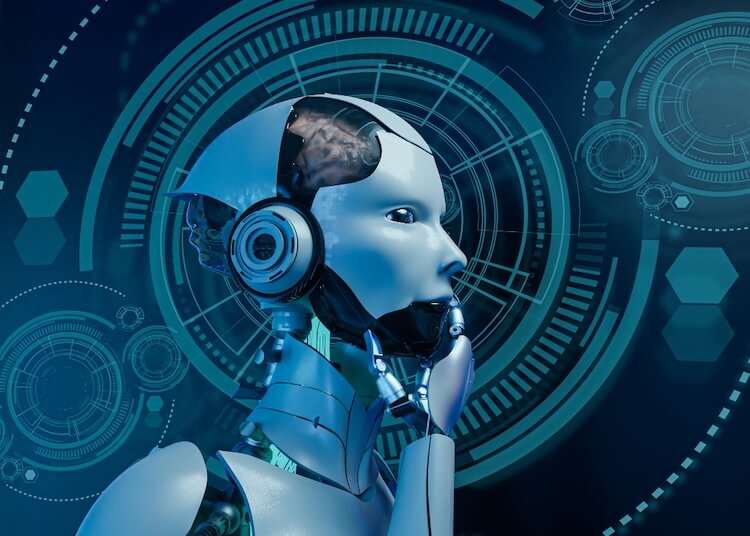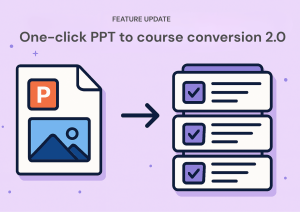
Artificial Intelligence in Training Revolutionizes Learning
- Author: Urban Rotar
- Published:

How can AI enhance the corporate learning process?
AI enhances corporate learning by making training interactive and engaging, using AI video creation tools and generative AI for dynamic materials. It also supports adaptive learning, catering to individual styles, improving course completion rates, and increasing efficiency.
What are the main challenges in adopting AI for corporate training?
Challenges include limited access to AI tools, resistance to replacing human instructors, integration with existing systems, managing implementation costs, and ensuring the availability of AI expertise and talent.
How does AI help in creating personalized learning experiences?
AI creates personalized learning experiences by analyzing learner data, recommending tailored training programs, and providing customized learning pathways. AI-driven insights ensure each employee receives targeted support, improving engagement and training effectiveness.
Key Takeaways - Artificial Intelligence in Training:
AI is transforming corporate training by creating personalized learning experiences and improving training outcomes.
AI-driven tools can automate course creation, saving time and enhancing content quality.
AI video creation tools make training more interactive, boosting engagement and completion rates.
Overcoming challenges in AI adoption includes managing costs, integration, and ensuring access to AI expertise.
The future of corporate learning lies in the collaboration between humans and AI to optimize training effectiveness.
The Need for Innovation in Corporate Learning
Current Challenges in Corporate Learning
Despite the significant investments in corporate training, and broad adoption of learning management systems (LMS) many organizations still face several challenges. One major issue is the limited access to AI tools and a general lack of experience in using them. Companies often worry about AI replacing human instructors, which can lead to resistance in adopting these technologies. Additionally, there is a growing need for more engaging and effective training programs that can hold the attention of employees and provide tangible benefits.
The Role of Technology in Addressing These Challenges
Technology, particularly AI, plays a crucial role in overcoming these challenges. By leveraging AI algorithms to enhance the learning process, organizations can improve training outcomes and create personalized learning experiences that identify and address knowledge gaps. AI tools can help tailor training programs to individual needs, ensuring that each employee receives the support they need to succeed.
The Benefits of Artificial Intelligence in Training
Enhancing the Learning Process with AI
Artificial intelligence can significantly enhance the learning process by making training more interactive and engaging. AI video creation tools, such as Synthesia, can be used to create training videos that save time, increase course completion rates, and make the training process more efficient and accessible. Generative AI tools, for example, can create dynamic and immersive training materials that capture the learners’ attention. AI-driven adaptive learning can also cater to individual learning styles, ensuring that each employee receives the most effective training possible.

Improving Training Outcomes with AI-Driven Insights
AI-driven insights can help organizations analyze learner data to identify areas of improvement and optimize training programs. Machine learning algorithms can predict learner outcomes and suggest interventions, ensuring that training programs are continuously refined to meet the evolving needs of the workforce.

AI Tools for Corporate Learning
Leveraging AI Tools for Efficient Content Management
AI tools, such as those utilizing natural language processing, can analyze and tag learning content within an AI-powered learning platform, making it easier to manage and access. AI-driven content creation can also reduce development time and costs, allowing organizations to produce high-quality training materials more efficiently.
The Role of AI in Creating Personalized Learning Experiences
AI can recommend training programs based on individual learner needs and preferences, creating customized learning pathways. Deep learning algorithms can analyze learner data to provide tailored training programs, ensuring that each employee receives the support they need to succeed.
Revolutionizing Training Programs with AI
Creating Customized Training Programs with AI
AI can analyze learner data to create tailored training programs, ensuring that each employee’s unique needs are met. AI-driven training recommendations can improve learner engagement and outcomes, making training more effective and impactful.
Streamlining Course Creation with AI-Driven Automation
AI can automate the course creation process, reducing development time and allowing subject-matter experts to focus on content quality. AI-driven authoring tools can empower these experts, enabling them to create more effective and engaging training programs.
Accelerating Upskilling Initiatives with AI
Identifying Learning Gaps with AI-Driven Skills Data
AI can analyze learner skills to identify knowledge gaps, allowing organizations to tailor their training programs accordingly. AI-driven skills tagging can organize and make learning content more discoverable, ensuring that employees can easily find the resources they need to improve their skills.
Proactively Supporting Learners with AI-Driven Recommendations
AI can provide personalized training recommendations based on learner needs and preferences, helping employees find the most relevant and effective training programs. AI-driven chatbots can support learners by providing real-time feedback and assistance, ensuring that they have the support they need to succeed.

Overcoming Challenges in AI Adoption
Integration and Infrastructure Challenges
Integrating AI tools with existing learning management systems and infrastructure can be challenging. Organizations need to ensure that their AI-driven training programs are scalable and reliable to meet the needs of their workforce.
Managing Costs and Talent for AI Implementation
Managing the costs of AI implementation and maintenance is a significant concern for many organizations. Ensuring access to AI expertise and talent is crucial for successful implementation, as it allows companies to fully leverage the benefits of AI in their training programs.
Effective Implementation of AI in Corporate Learning
Best Practices for Integrating AI into Training Programs
To effectively integrate AI into training programs, organizations should ensure that AI initiatives align with business objectives and learning goals. Implementing AI-driven training programs in phases can help ensure successful adoption and allow for adjustments based on initial feedback.

Measuring the Impact of AI on Corporate Learning Outcomes
Tracking key performance indicators (KPIs) is essential for measuring the effectiveness of AI-driven training programs. Regular assessments can ensure that these programs meet business objectives and provide valuable insights for continuous improvement.
The Future of Corporate Learning
Trends and Predictions for AI in Training and Development
The adoption of AI-driven training programs in corporate learning is expected to increase significantly. As AI skills become more important in the workforce, organizations will need to invest in AI to stay competitive and meet the evolving needs of their employees.

The Game-Changing Partnership Between Humans and AI
The collaboration between humans and AI has the potential to enhance the learning process and improve training outcomes significantly. Ensuring that AI supports human instructors and learners, rather than replacing them, will be crucial for the successful adoption of AI in corporate learning.
Conclusion
AI can enhance the learning process, improve training outcomes, and create personalized learning experiences. It can streamline course creation, identify knowledge gaps, and provide proactive support to learners. AI has the potential to revolutionize corporate learning and improve business outcomes. Effective implementation of AI requires careful planning, integration, and measurement to ensure successful adoption and maximize the benefits of AI-driven training programs.



